[swarthmore cs75] Compiler 1 – Adder
课程回顾
Swarthmore学院16年开的编译系统课,总共10次大作业。本随笔记录了相关的课堂笔记以及第3次大作业。
- 编译的过程:首先解析(parse)源代码,然后成抽象语法树(AST),再生成汇编代码(asm),最后用asm生成的目标文件(object)和其他库文件链接成一个可执行的二进制文件(binary)。其中从抽象语法树到生成汇编代码这个过程(complier.ml)工作量最大。
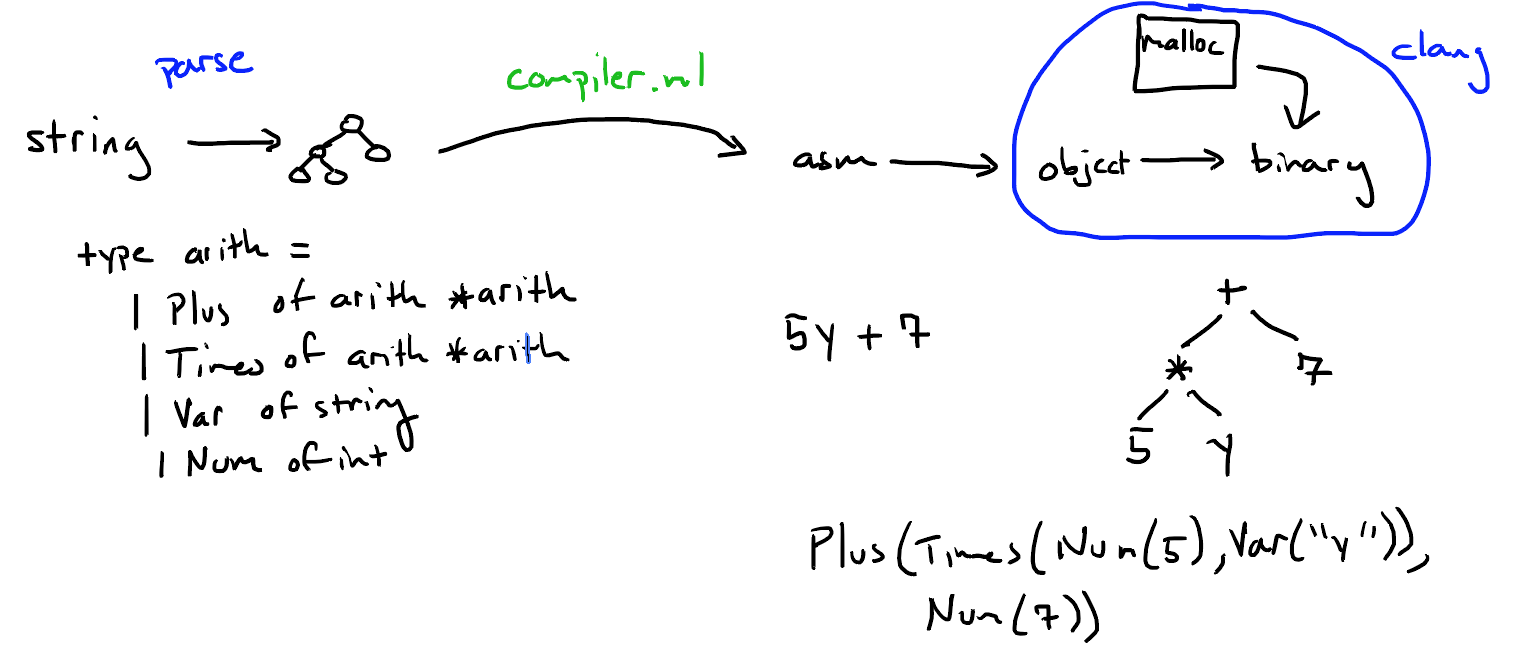
- 具体语法树(Concrete Syntax Tree):programmer写的就是具体语法,下图展示了某具体语法形象的表示。
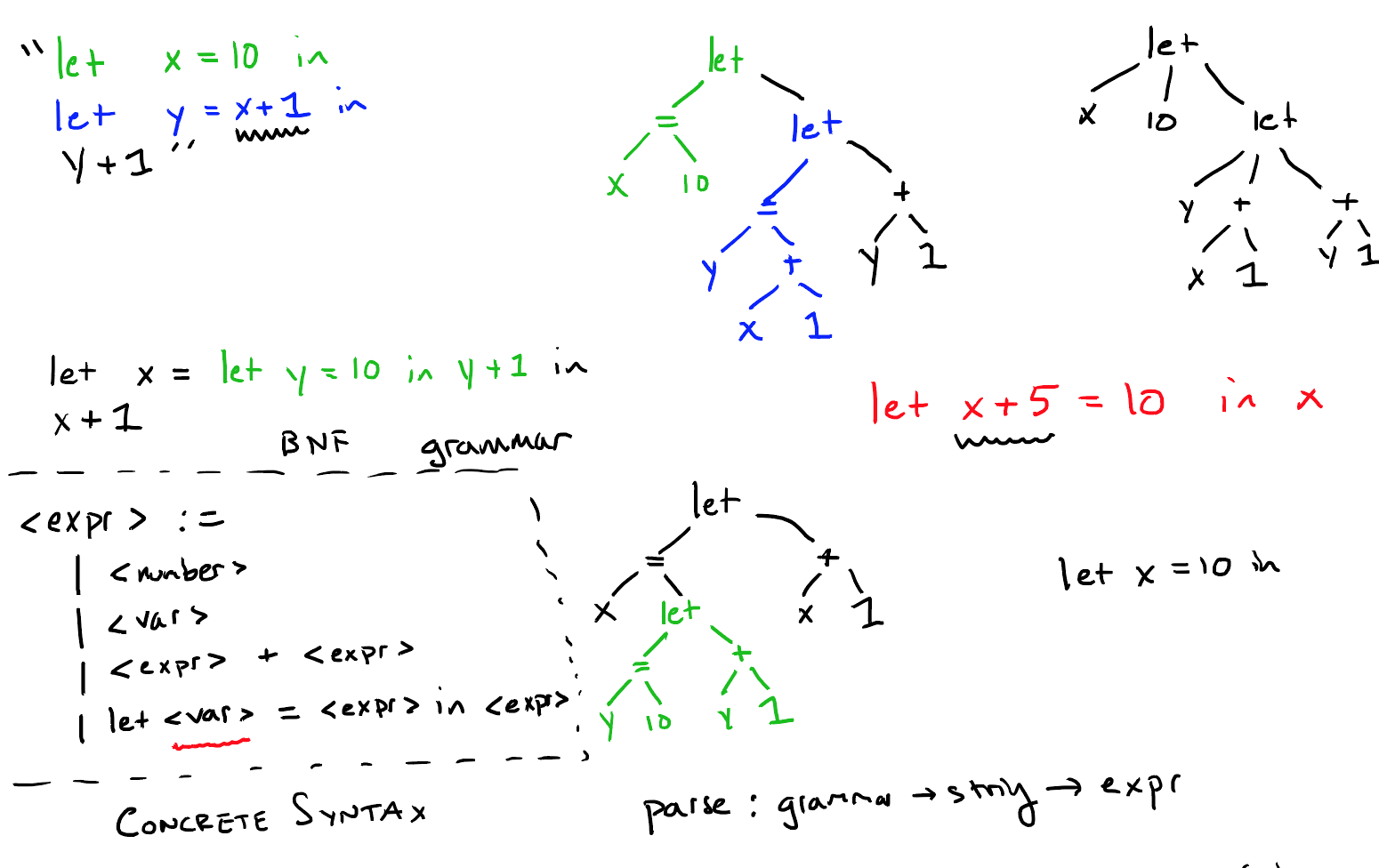
- 抽象语法树(Abstract Syntax Tree):一段具体语法,应该在内存中用何种数据结构来表示。所以根据具体语法的定义,有了抽象语法的概念。比如:let x=6, y=add1(x) in y; 在内存中可以表示为 Let([(x, 6), (Prim1(add1, Id("x")))], Id("y"))
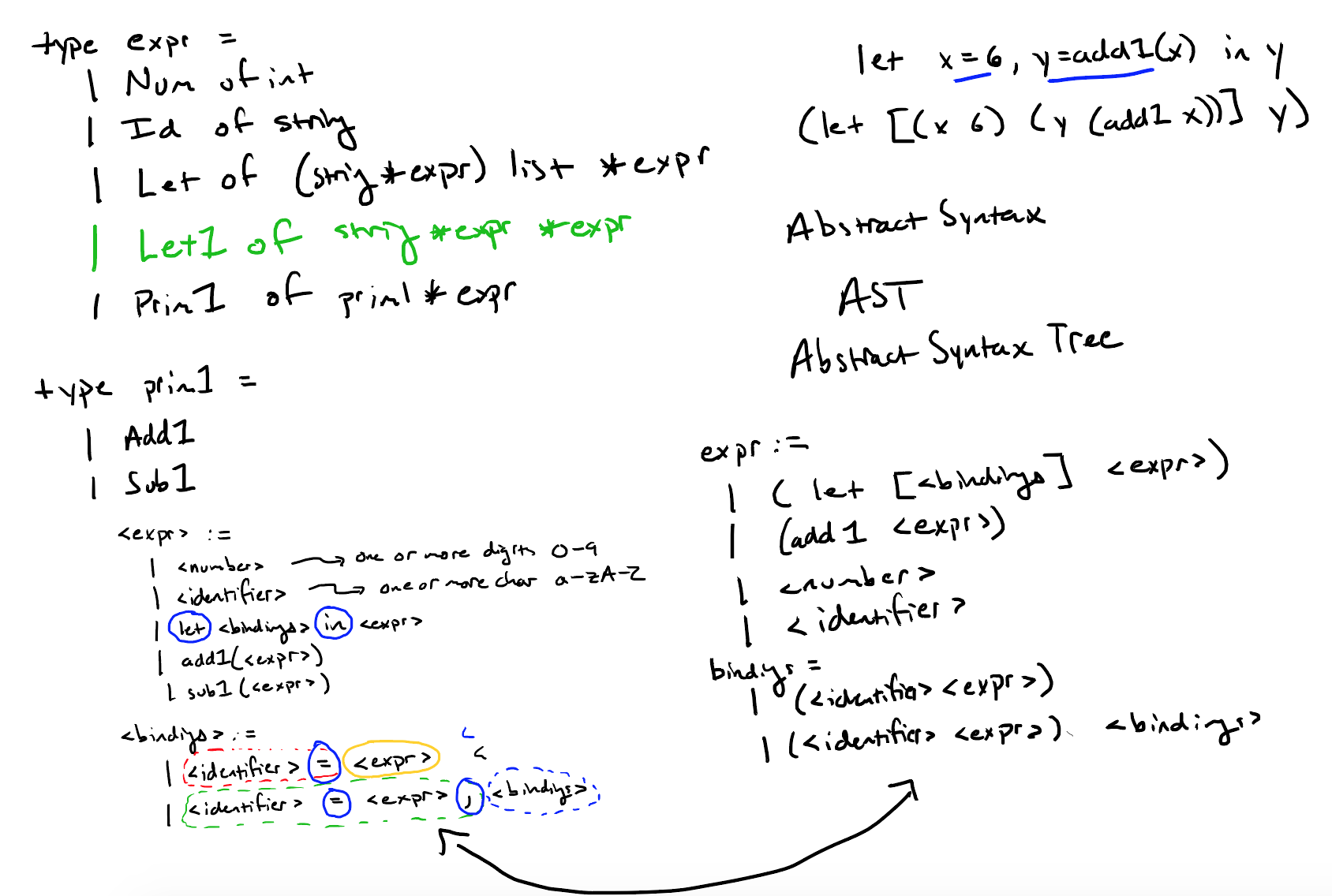
- 汇编代码生成(Add1、Sub1):
- Add1:需要将操作数mov到eax寄存器,然后把eax加1即可,这里操作数可能是一个表达式的计算结果,所以需要递归求值。
- Sub1:同理

- 汇编代码生成(Let、Id):
- Id:检查当前env是否绑定了某变量的地址,如果绑定了,把操作数(esp[地址偏移量])移动到eax寄存器,否则抛出错误。
- Let:为了简化问题,假设let中的binding list只有一个元素,比如要计算:let ex in eb;首先要对ex=(x, value)中的value进行递归求值(参数使用env和si);然后为x绑定一个新地:-4 * si,添加到new_env中,并对eb进行递归求值(参数使用new_env并将si+1)。最后将两个递归所生成的指令拼接到一起。
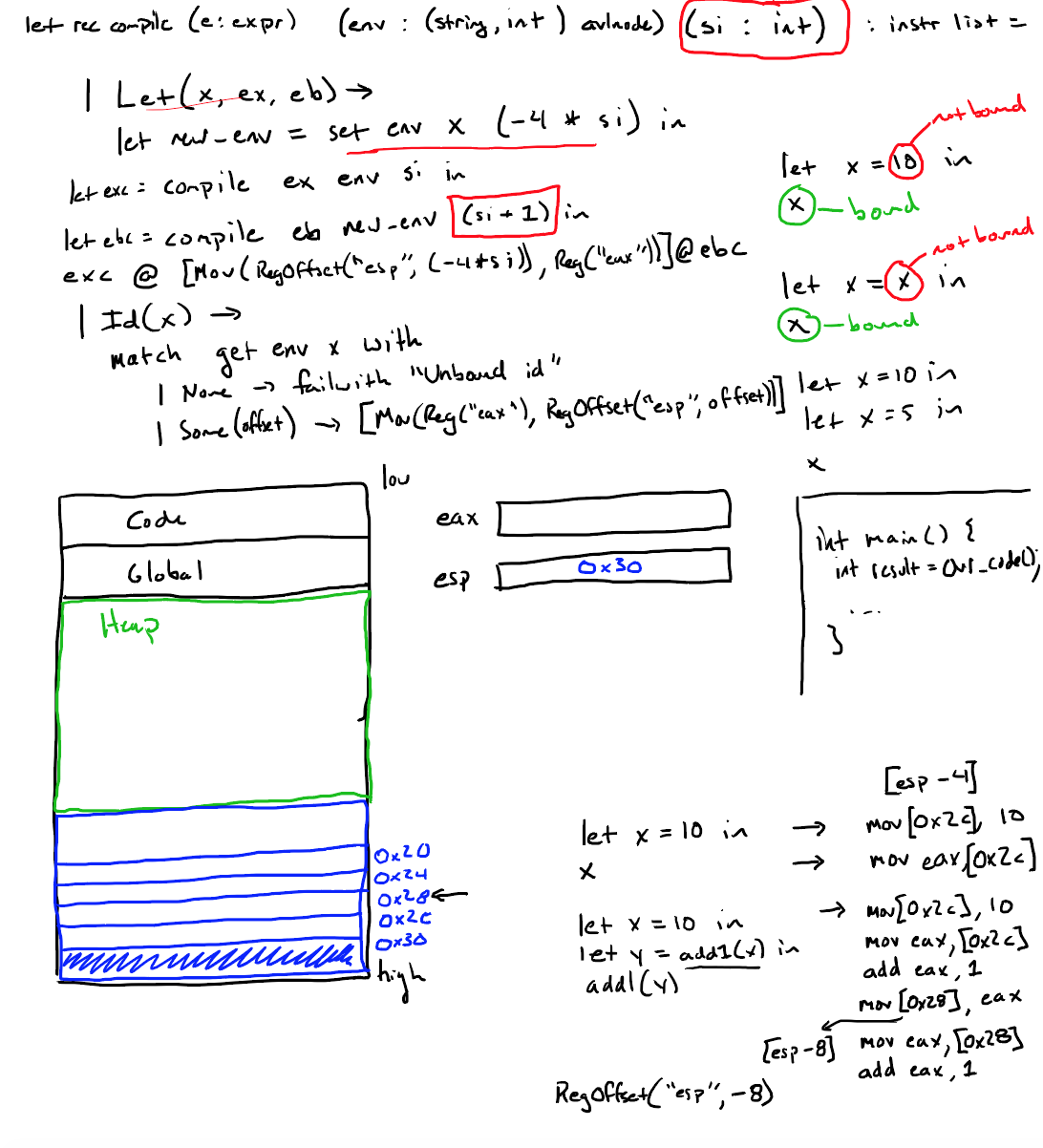
- 汇编代码生成(案例):注意下图第一个例子在对x进行赋值操作的时候,变量x并没有使用一个新的地址:esp-8,而是重复利用了变量y的地址:esp-4。因为变量y在外部无法引用。
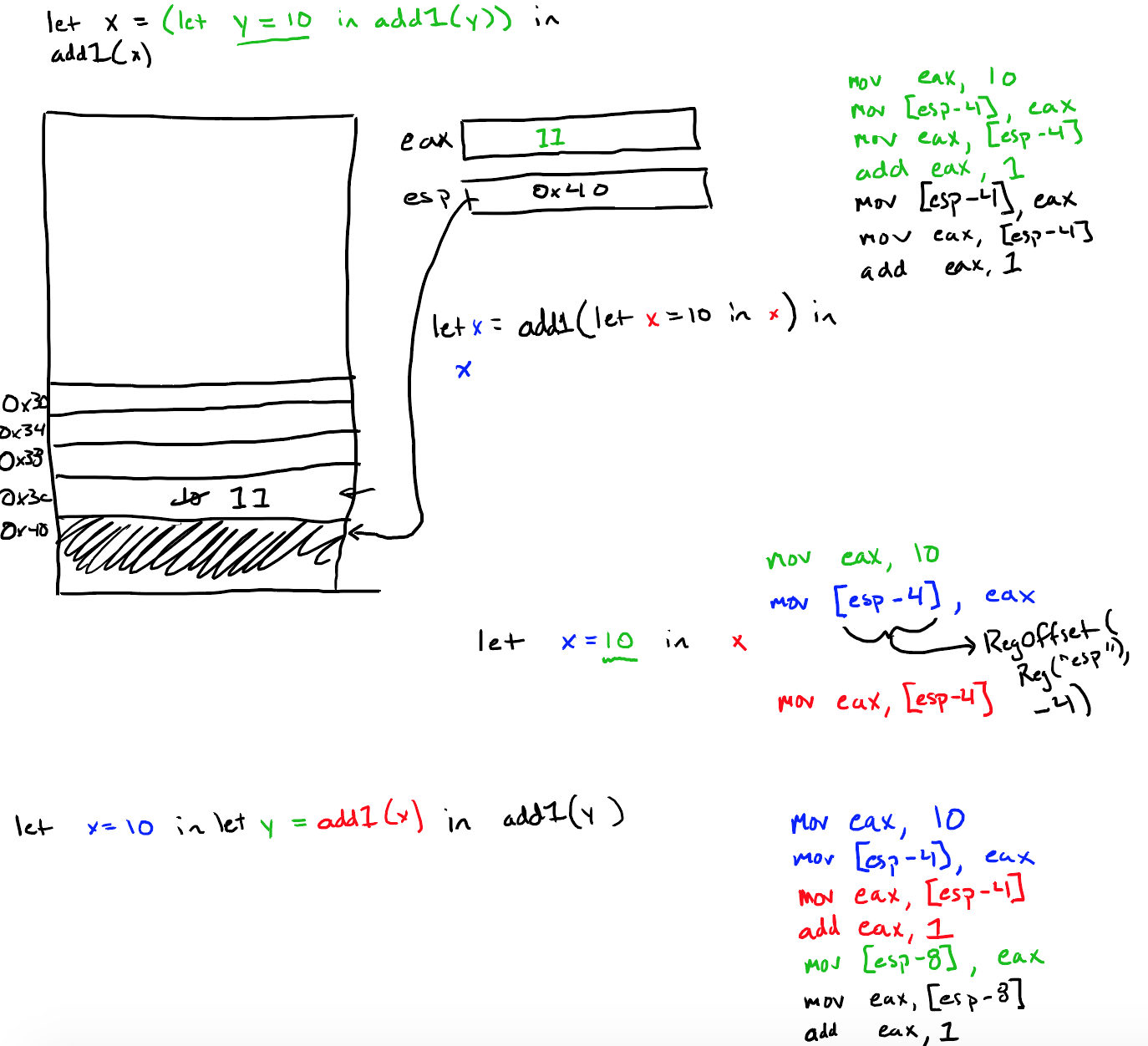
编程作业
本次大作业是为Adder编程语言实现一个小型编译器,将Adder程序编译为X86_32汇编。
具体语法:
<expr> :=
| <number>
| <identifier>
| let <bindings> in <expr>
| add1(<expr>)
| sub1(<expr>) <bindings> :=
| <identifier> = <expr>
| <identifier> = <expr>, <bindings>
抽象语法:
type prim1 =
| Add1
| Sub1 type expr =
| Number of int
| Prim1 of prim1 * expr
| Let of (string * expr) list * expr
| Id of string
程序例子:
Concrete Syntax Abstract Syntax Answer 5 Number(5) 5 let x=(let y=10 in y) in x Let(["x", Let(["y", 10], Id("y"))], Id("x")) 10 let x=100 in let x=1 in x Let(["x", Number(100), Let(["x", 1], Id("x"))]) 1 let x = 5 in add1(x) Let([("x", Number(5))], Prim1(Add1, Id("x"))) 6 let x=1 in let y=add1(x) in y Let(["x", 1], Let(["y", Prim1(Add1, Id("x"))], Id("y"))) 2 sub1(add1(sub1(5))) Prim1(Sub1, Prim1(Add1, Prim1(Sub1, Number(5)))) 4 let x=10 in let y=add1(x) in add1(y) Let(["x", 10], Let(["y", Prime1(Add1, Id("x"))], Prime1(Add1, Id("y")))) 12 let x = 5, y = sub1(x) in sub1(y) Let([("x", Number(5)), ("y", Prim1(Sub1, Id("x")))], Prim1(Sub1, Id("y"))) 3 let x=1 in let x=add1(let x=6 in add1(x)) in x Let(["x", 1], Let(["x", Prim1(Add1, Let(["x", 6], Prim1(Add1, Id("x"))))], Id("x"))) 8 let y=sub1(add1(sub1(let x=5 in x))) in add1(add1(add1(y))) Let(["y", Prim1(Sub1, Prim1(Add1, Prim1(Sub1, Let(["x", Number(5)], Id("x")))))], Prim1(Add1, Prim1(Add1, Prim1(Add1, Id("y"))))) 7
| let x=1 in y|
-
|An identifier is unbound (there is no surrounding let binding for y)|
| let x=10, y=20, x=5, y=30, x=40 in x|
-
|There is a binding list containing two or more bindings with the same name|
实现一(Let使用尾递归):
分别实现Let、Id、Prim1的代码生成逻辑。因为Adder语法规定,不允许在一个binding list绑定两个相同的变量,所以这里简单的实现了一个has_unique_key方法,判断binding list的长度和去重后的长度是否相同。let rec compile_env
(p : expr)
(stack_index : int)
(env : (string * int) list)
: instruction list =
match p with
| Number(n) ->
[
IMov(Reg(EAX), Const(n))
]
| Let(binds, body) ->
let rec helper xs si env =
match xs with
| [] -> compile_env body (si + 1) env
| (id, expr)::rest ->
let new_env = (id, (-4) * si)::env in
(compile_env expr si env) @ [IMov(RegOffset((-4) * si, ESP), Reg(EAX))] @ helper rest (si + 1) new_env
in
if has_unique_key binds then
helper binds stack_index env
else
failwith "There is a binding list containing two or more bindings with the same name."
| Id(x) ->
[
match (find env x) with
| Some(n) -> IMov(Reg(EAX), RegOffset(n, ESP))
| None -> failwith ("An identifier is unbound (there is no surrounding let binding for " ^ x ^ " )")
]
| Prim1(op, e) ->
match op with
| Add1 -> (compile_env e stack_index env) @ [IAdd(Reg(EAX), Const(1))]
| Sub1 -> (compile_env e stack_index env) @ [ISub(Reg(EAX), Const(1))]
实现二(Let使用迭代):
本实现仅改写了Let的模式匹配逻辑,其他类型的pattern mathcing和上述代码一样。let new_env = List.mapi (fun si (x, _) -> x, (-4) * (stack_index + si)) binds @ env in
let f si (_, e) -> (compile_env e stack_index new_env) @ [IMov(RegOffset((-4) * (stack_index + si), ESP), Reg(EAX))] in
let exc = List.flatten (List.mapi f binds) in
let exb = compile_env body (stack_index + 1) (new_env) in
exc @ exb
有一个地方需要注意一下,比如在对表达式:
let x=10, y=sub1(x) in y
进行求值的时候,会执行上述代码并会返回:
new_env = [("x", -4); ("y", -8)]
exc = List.flatten (List.mapi f [("x", Number(10)), ("y", Prim1(Sub1, Id("x")))])在函数f中,使用的是new_env作为compile_env递归调用的参数。实际上:
- 在计算Number(10)的时候,compile_env只需要传入env,而不是 [("x", -4); ("y", -8)] @ env
- 在计算Prim1(Sub1, Id("x")))的时候,compile_env只需要传入("x", -4)::env,而不是 [("x", -4); ("y", -8)] @ env
- ...以此类推。
因为Adder语言不支持binding list出现重名的变量,所以这里直接传入new_env不会出现问题。当然要是改进可以用切片操作或使用实现一中的尾递归,这里就不详述了。
测试时可能出现的错误:
Error: This expression has type bytes but an expression was expected of type string
⤇ export OCAMLPARAM="safe-string=0,_"
参考资料
starter-adder
safe-string-error
[swarthmore cs75] Compiler 1 – Adder的更多相关文章
- [swarthmore cs75] Compiler 6 – Garbage Snake
课程回顾 Swarthmore学院16年开的编译系统课,总共10次大作业.本随笔记录了相关的课堂笔记以及第9次大作业. 赋值的副作用:循环元组 下面的代码展示了Python3是如何处理循环列表(pri ...
- [swarthmore cs75] Compiler 6 – Fer-de-lance
课程回顾 Swarthmore学院16年开的编译系统课,总共10次大作业.本随笔记录了相关的课堂笔记以及第8次大作业. First-class function: It treats function ...
- [swarthmore cs75] Compiler 5 – Egg-eater
课程回顾 Swarthmore学院16年开的编译系统课,总共10次大作业.本随笔记录了相关的课堂笔记以及第7次大作业. 抽象语法: 存储方式: 栈中的数据如果最后三位(tag bits)是001表示元 ...
- [swarthmore cs75] Compiler 4 – Diamondback
课程回顾 Swarthmore学院16年开的编译系统课,总共10次大作业.本随笔记录了相关的课堂笔记以及第6次大作业. 函数声明 增加函数声明.函数调用的抽象语法:在转换成anf之前还要检查函数声明和 ...
- [swarthmore cs75] Compiler 3 – Cobra
课程回顾 Swarthmore学院16年开的编译系统课,总共10次大作业.本随笔记录了相关的课堂笔记以及第5次大作业. 增加了bool数据表示和比较运算符的支持,具体语法参考下图: 第一种int和bo ...
- [swarthmore cs75] Compiler 2 – Boa
课程回顾 Swarthmore学院16年开的编译系统课,总共10次大作业.本随笔记录了相关的课堂笔记以及第4次大作业. A-Normal Form 在80年代,函数式语言编译器主要使用Continua ...
- [swarthmore cs75] inlab1 — Tiny Compiler
课程回顾 Swarthmore学院16年开的编译系统课,总共10次大作业.本随笔记录了inlab1的实践过程. tiny compiler 这个迷你的编译器可以将一个源文件,编译成可执行的二进制代码. ...
- [swarthmore cs75] Lab 1 — OCaml Tree Programming
课程回顾 Swarthmore学院16年开的编译系统课,总共10次大作业.本随笔记录了相关的课堂笔记以及第2大次作业. 比较两个lists的逻辑: let rec cmp l ll = match ( ...
- [swarthmore cs75] Lab 0 Warmup & Basic OCaml
课程回顾 Swarthmore学院16年开的编译系统课,总共10次大作业.本随笔记录了相关的课堂笔记以及第1次大作业. 什么是编译 编译就是执行Program->Program'转换的过程,如下 ...
随机推荐
- Cmake实践(Cmake Practice)第一部分
参考资料地址:https://github.com/Akagi201/learning-cmake/blob/master/docs/cmake-practice.pdf 一.初识cmake 1. C ...
- NYOJ37-回文字符串(dp)
37-回文字符串 内存限制:64MB 时间限制:3000ms 特判: No通过数:88 提交数:177 难度:4 题目描述: 所谓回文字符串,就是一个字符串,从左到右读和从右到左读是完全一样的,比如& ...
- 手机访问电脑端Wampserver2.4-x64服务
我用的Wampserver2.4-x64 1. 先确保你的手机和电脑连在同一个局域网内. 2. Window + R, 然后输入 ipconfig,然后获取ip地址, 长这样: 192.168.XX. ...
- python bmp转jpg 且灰度图转彩色
今天在简书,上看到了一个 bmp转jpg的代码,便记录一下. # coding:utf-8 import os from PIL import Image # bmp 转换为jpg,灰度图转RGB d ...
- BOOST_PREVENT_MACRO_SUBSTITUTION
[BOOST_PREVENT_MACRO_SUBSTITUTION] 用于防止函数被macro替换的问题. 例如: 参考: 1.https://blog.csdn.net/yanxiangtianji ...
- 基于Dapper写的一个sqlhelp适用于多版本数据库
ConnectionInit方法用于初始化数据库连接对象, 只需要修改databasetype参数即可进行适用各个版本的数据库, ExecuteNonQuery方法用于执行增.删.改操作,返回受影响的 ...
- 【JavaScript】EasyUIのForm的跨域提交问题解析
昨日.プログラムを作るとき.一つの問題がありますが.皆に共有します. [問題] EasyUIのFormでURLを請求するとき.返却の値が取得できない. [ソース] var fnRegUser = fu ...
- oracle中的exists 和 in 用法详解
以前一直不知道exists和in的用法与效率,这次的项目中需要用到,所以自己研究了一下.下面是我举两个例子说明两者之间的效率问题. 前言概述: “exists”和“in”的效率问题,涉及到效率问题也就 ...
- Servlet+JSP例子
前面两节已经学习了什么是Servlet,Servlet接口函数是哪些.怎么运行.Servlet生命周期是什么? 以及Servlet中的模式匹配URL,web.xml配置和HttpServlet.怎么 ...
- C#使用CefSharp开源库开发Chrome 浏览器
一.介绍 这个东西我以前没有接触过,但是公司项目里面有用到这个东西,所以就顺便研究一下.今天只是做了 WinForm 的测试,有时间了在试试 WPF 是如何实现的.刚开始一塌糊涂,有点麻 ...
